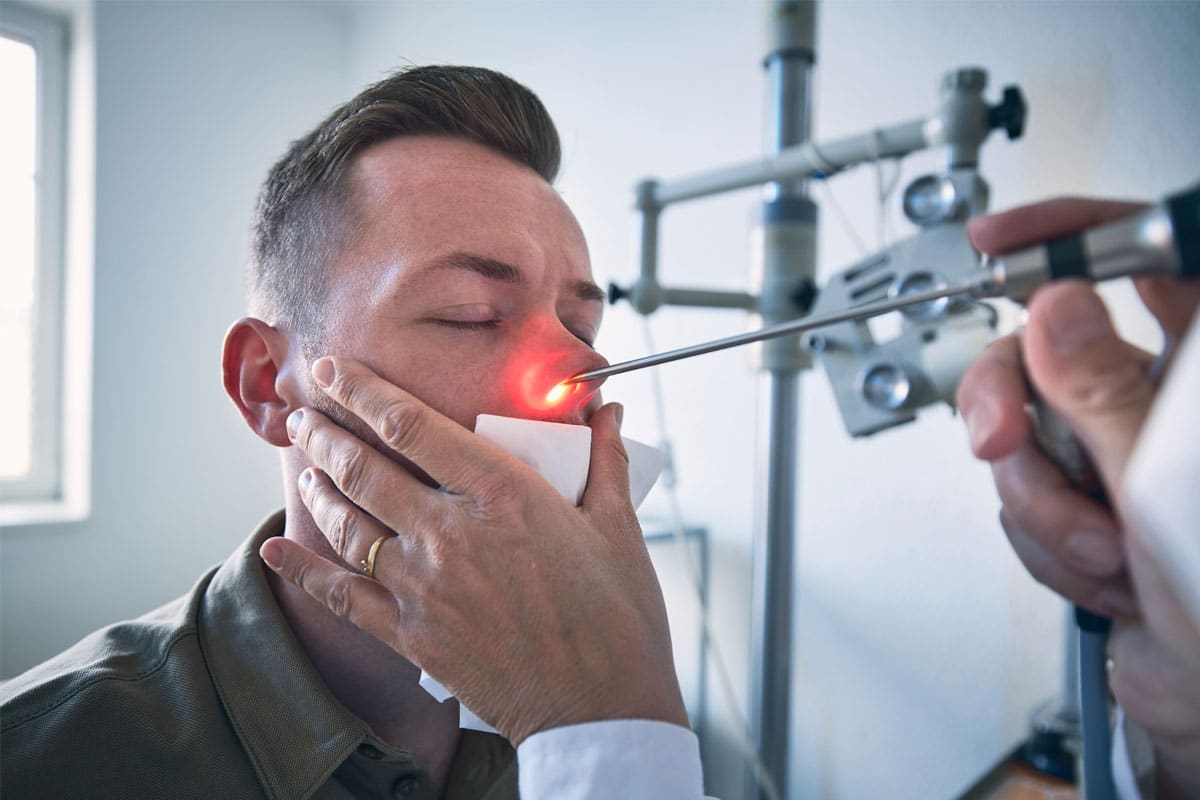
Snoring laser treatment can be an alternative to surgery that may offer relief. Snoring is the sound that occurs when the tissues at the back of the mouth and throat vibrate due to breathing while asleep. It is a common issue that can negatively impact a person’s health and well-being, as well as that of their partner and even other household members. It can lead to exhaustion, stress, and difficulty concentrating.
Snoring may also contribute to health, lifestyle, and social issues, poor school and workplace performance, relationship conflict, and can even contribute to several chronic health conditions including mood disorders, cardiovascular disease, Alzheimer’s disease, and cancer.
Habitual snorers and their partners often become desperate for lasting, effective solutions to minimise (or preferably stop) snoring. Depending on how severe the snoring is, as well as other factors considered following proper assessment by doctors, surgery may be recommended for some moderate to severe snorers, especially if the cause is anatomical.
Snoring laser treatment is a non-invasive approach and an alternative to surgery that may offer a lasting, effective solution to help minimise snoring.
What is Snoring Laser Treatment?
Laser treatments for snoring use heat (produced by a laser or radiofrequency device) to modify the oral mucosal tissues which vibrate to cause snoring.
The process is called neocollagenesis.
The loose, weak, or floppy tissues of the soft palate, base of the tongue, back of the throat, and the uvula are targeted with a carefully controlled application of heat. This stimulates collagen fibres in the deeper tissues, and the targeted tissues are triggered to shrink and form new, stronger collagen to restore elasticity and strength. This in turn tightens and reduces overall tissue volume. It helps to prevent the soft palate and uvula from obstructing the airway and vibrating and it also tightens the muscles of the mouth and throat, opening the airway for clearer, easier, snore-free breathing.
Anti-snoring laser treatment is conducted in a clinic and does not require a hospital admission or any anaesthetic. It is fast, is usually completed over just a few sessions, has no downtime at all, and most patients recover very quickly over a day or two with minimal discomfort.
How Does Laser Treatment Differ from Other Surgeries for Snoring?
Non-invasive snoring laser treatments should not be confused with minimally-invasive or surgical procedures that use laser devices.
Invasive surgical procedures to help with snoring include surgery to remove the tonsils and/or adenoids, to remove the uvula, to splint the palate, correction of a deviated septum, sinus scraping, and others. These are significant surgeries assisted with lasers (used to make incisions in preference to scalpels) and carried out under general anaesthetic.
Laser-assisted uvulopalatoplasty uses a laser device to remove very small amounts of tissue from the uvula and soft palate, and a local anaesthetic is all that’s usually required. It does have some risks, including infection risk (which is associated with all surgeries), a potential for ongoing globus sensation (feeling of a lump in the throat) and, very rarely, ongoing issues with speech as a result of changes to the soft palate. It is also not a permanent solution and scar tissue formation may present ongoing concerns. It is also quite a painful procedure with a recovery of up to a fortnight.
Laser treatment for snoring is non-surgical, non-invasive, and much safer and more comfortable. It is also useful to help people with obstructive sleep apnoea, used alongside other medically-approved treatments and solutions.
How Does it Compare to Other Snoring Interventions?
Compared with surgical snoring interventions, laser treatment for snoring offers several advantages:
- Safer and non-invasive
- No hospital admission
- No anaesthesia
- A quick, effective procedure
- No downtime
- Minimal discomfort
- Fast recovery
- No needles or injections
- No incisions, no bleeding, no infection risk
- Medicare and private health fund rebates may be available
- Permanent improvement of snoring from mouth breathing
- Reduced long-term risks of developing diabetes, heart disease, and other snoring-related health conditions
- Immediate reduction in snoring for some patients; the majority will note an improvement begins within a week.
It must be understood, however, that results from these treatments can be variable, though the majority of people do experience significant improvement in their snoring.
It also does have some side effects compared with more conservative anti-snoring solutions like using snoring mouth guards, nasal strips, CPAP for sleep apnoea, lifestyle modifications, and other snoring solutions.
- The main side effect of this approach to stop snoring is a mild dry or sore throat for a day or two after. Temporary throat swelling may rarely occur.
- Ongoing maintenance treatments may be required every six or twelve months to enhance outcomes.
Snoring laser treatment usually improves snoring by around 75%; it is not a complete cure but rather an effective technique to alleviate and manage the problem. Results will vary from person to person depending on their individual anatomy and personal response to the treatment.
When to Consider Snoring Laser Treatment
Snoring laser treatment should be considered when more conservative solutions to stop snoring have failed, or where snoring is very severe. These conservative approaches include:
- Losing weight
- Exercising regularly
- Not eating large meals within a few hours of bedtime
- Limiting alcohol consumption, especially within a few hours of bedtime
- Quitting smoking and vaping
- Not using illicit drugs
- Appropriately treating allergies and chronic sinus/nasal anatomical issues
- Avoiding sedatives
- Sleeping on your side
- Raising the head of the bed
- Using a mandibular advancement device like SnoreMD
- Seeing your doctor promptly for appropriate treatment if you suspect you suffer from obstructive sleep apnoea
It’s important to appreciate that laser treatments for snoring work best when combined with lifestyle changes, sleep position changes, and using the right stop-snoring device to maximise results.
Easily, Affordably Reduce Snoring with SnoreMD
SnoreMD is a great way to conservatively and affordably address snoring that arises from mouth breathing. As a world-class, fully adjustable, anti-snoring device, SnoreMD is worn in the mouth during sleep to gently move the lower jaw slightly forward. This helps to open the airways and reduce snoring.
Even if you have undergone (or intend to undergo) laser snoring treatment, using SnoreMD as well can enhance and maximise your results to dramatically improve and even eliminate snoring.
Wake up a better you with SnoreMD.
Explore how SnoreMD works and buy now.


